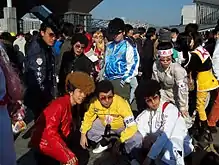Punch perm
A punch perm (パンチパーマ, panchi pāma) is a type of tightly permed male hairstyle in Japan. From the 1970s until the mid-1990s, it was popular among yakuza, chinpira (low-level criminals), bōsōzoku (motorcycle gang members), truck drivers, construction workers, and enka singers. The punch perm began to fall out of usage as a result of its general association with the yakuza, as well as normal fashion trends. The style is similar to the Jheri curl, which was popular in the United States during roughly the same time frame, but the curls in a punch perm are much tighter.

History
The hair style was invented by Shigemi Naganuma, a Japanese barber at the hair salon Naganuma in Kokurakita-ku, Kitakyūshū in the 1960s. He based the style on black hair. At that time, hair irons were round and could not hold the hair tightly. Naganuma modified the iron by filing it into a hexagonal shape, like a pencil, which created a tighter hold.[1] He originally named the style "champion press", however, it came to be called "punch perm". According to one theory, the name is because of its punchy and powerful appearance.[2]
In popular culture
- The character Bunta Takakura from the popular anime and manga series Crayon Shin-chan has a punch perm.
- Piko Taro, singer of PPAP (Pen-Pineapple-Apple-Pen), is known for his punch perm and loud clothes.
- Kazuma Kuwabara from Yu Yu Hakusho wears a sort of them.
- Kasuga Ichiban from Yakuza: Like a Dragon and Ryu ga Gotoku Online is depicted wearing a punch perm in the late 90s. Upon his release from prison at the start of the game, a hairstylist tries and fails to replicate his old hairstyle, inadvertently giving him the wild mane he wears throughout the rest of the game.
See also
References
- "Shigemi Naganuma, the father of punch perm, died on 3rd Apr. 2012 at age 75". Mainichi Shimbun (in Japanese). April 14, 2012. p. 1. Archived from the original on June 21, 2012. Retrieved March 5, 2013.
- NHK Quiz Nihonjin no Shitsumon group, ed. (1996). クイズ 日本人の質問 (in Japanese). Tokyo, Japan: Kawade Shobo Shinsha. p. 214. ISBN 4309491456.
External links
- Yakuza: Japan's Criminal Underworld chapter 12, David E. Kaplan and Alec Dubro, University of California Press. ISBN 978-0-520-21562-7.
 The dictionary definition of punch perm at Wiktionary
The dictionary definition of punch perm at Wiktionary